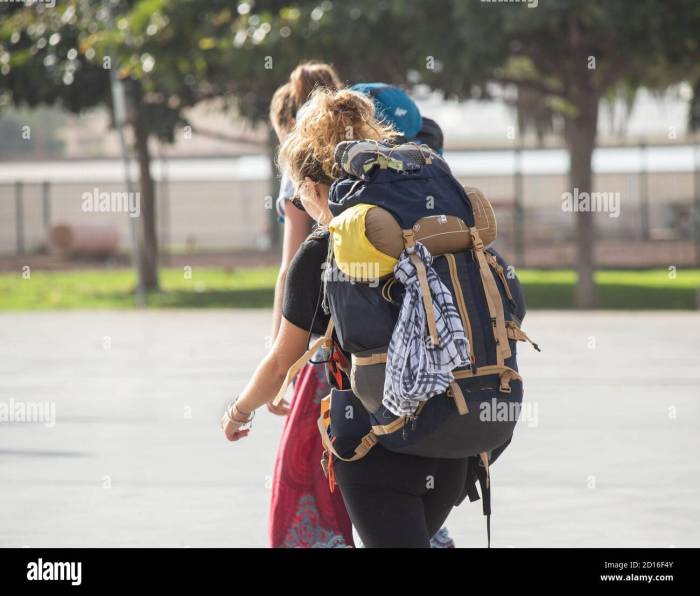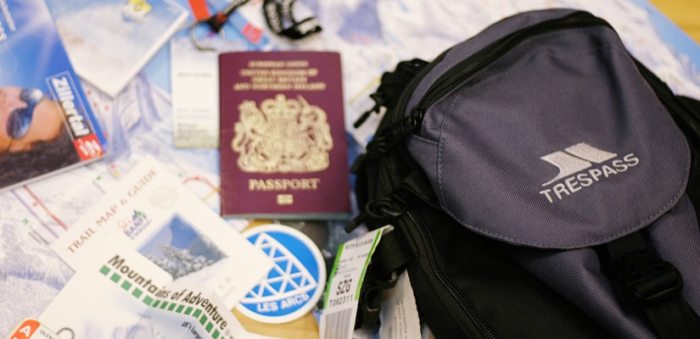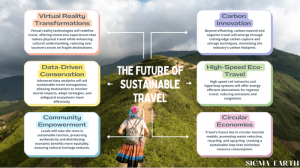
Gap year backpacking: Embark on a transformative journey of self-discovery and global exploration. This comprehensive guide delves into the essential aspects of planning, budgeting, and navigating the exciting world of extended travel, offering practical advice and inspiring insights for aspiring backpackers. Whether you dream of trekking through Southeast Asia’s vibrant landscapes, exploring South America’s ancient ruins, or traversing Europe’s charming cities, this guide equips you with the knowledge and confidence to make your gap year unforgettable.
From meticulous itinerary design and budget allocation to crucial safety considerations and diverse accommodation options, we cover everything you need to know. Learn how to find the best flight deals, navigate various transportation methods, and select accommodations that suit your style and budget. We’ll explore diverse travel styles, from train journeys across continents to unique stays in treehouses and yurts, offering a holistic perspective on crafting your ideal backpacking adventure.
Hotel Reviews and Tips

Navigating the world of hotel bookings during a gap year backpacking trip requires careful planning and a savvy approach. Finding the right balance between budget, location, and amenities can significantly impact your overall travel experience. This section provides guidance on selecting hotels and maximizing value for your money.Choosing the right hotel involves considering several key factors. Budget is often the primary constraint, followed by location and the desired amenities.
Understanding these factors will help you make informed decisions and avoid costly mistakes.
Budget-Conscious Hotel Selection
Budget is a crucial factor when selecting accommodation. Backpackers often operate on a tight budget, so finding affordable yet comfortable hotels is essential. Consider hostels as a budget-friendly alternative to hotels, offering dorm rooms and private rooms at significantly lower prices. Websites like Hostelworld and Booking.com offer extensive listings and user reviews to help you compare options.
Budget hotels often lack certain amenities found in more expensive options, but their affordability can free up funds for other aspects of your trip. For example, a basic, clean hotel room near public transport might be preferable to a luxurious hotel far from your planned activities.
Hotel Location and Accessibility
Location plays a vital role in your overall travel experience. A hotel’s proximity to major attractions, public transportation, and local amenities can significantly impact convenience and cost. Consider whether you prioritize being close to the city center, near natural attractions, or in a quieter residential area. Hotels in central locations are generally more expensive but offer easy access to sights and activities.
Hotels further from the center may be cheaper but require more time and money for transportation. Carefully weigh the trade-offs between cost and convenience when making your decision. For instance, a slightly more expensive hotel near a train station might save you money on taxis and allow you to explore more destinations.
Hotel Amenities and Services
While budget and location are important, the amenities offered by a hotel can enhance your stay. Consider factors such as Wi-Fi access (essential for communication and research), air conditioning (especially in warmer climates), a clean and comfortable room, and 24-hour reception (for late arrivals or emergencies). While luxury amenities like swimming pools or spas might be tempting, they are often unnecessary for budget travelers.
Prioritize essential amenities that improve comfort and convenience without breaking the bank. For example, free breakfast can save you money on daily meals, while a laundry service can be a lifesaver during a long trip.
Finding Hotel Deals and Discounts
Numerous strategies can help you find discounted hotel rates. Websites like Booking.com, Expedia, and Kayak allow you to compare prices from various hotels and often offer exclusive deals. Consider booking your accommodation in advance, especially during peak season, to secure better rates. Flexible travel dates can also unlock significant savings, as prices often fluctuate depending on the day of the week or time of year.
Signing up for hotel loyalty programs can provide discounts and perks, such as free Wi-Fi or room upgrades. Lastly, look for last-minute deals, as hotels often reduce prices to fill empty rooms. Websites and apps specializing in last-minute bookings can be valuable resources.
Writing Effective Hotel Reviews
Writing honest and helpful hotel reviews benefits both you and other travelers. When writing a review, focus on specific aspects of your stay, such as the cleanliness of the room, the friendliness of the staff, and the hotel’s location. Include both positive and negative points, providing constructive feedback that helps others make informed decisions. Avoid overly emotional language or personal attacks, and stick to factual observations.
A well-written review should accurately reflect your experience and provide valuable insights to future guests. For example, instead of saying “The hotel was terrible,” you could write, “The room was small and lacked adequate ventilation, which made it uncomfortable to sleep in.” Providing specific details enhances the credibility and helpfulness of your review.
RV and Camper Travel
RV and campervan travel offer a unique backpacking experience, differing significantly from traditional backpacking or even car-based travel. This mode of adventure provides a blend of freedom and comfort, allowing for immersive exploration while maintaining a level of self-sufficiency and convenience not found in other methods. The key differences lie in the level of mobility, accommodation, and overall cost.RV and campervan travel contrasts sharply with traditional backpacking, which often involves carrying all belongings on your back and relying on hostels or guesthouses for accommodation.
Car-based travel, while offering more comfort, typically limits spontaneous exploration due to hotel bookings and fixed itineraries. RV and campervan travel sits somewhere in between, offering a balance of mobility and comfort.
RV versus Campervan: A Comparison
Campervans, typically smaller and more fuel-efficient, are better suited for solo travelers or couples, prioritizing maneuverability and ease of parking in tighter spaces. RVs, often larger and more luxurious, are better suited for families or groups, providing more living space and amenities. The choice depends heavily on travel style, budget, and the number of people traveling. For example, navigating narrow European streets is far easier in a campervan than a large RV.
Conversely, an RV offers more comfort for a family traveling across the vast distances of North America.
Renting versus Buying: Weighing the Pros and Cons, Gap year backpacking
The decision to rent or buy an RV or campervan involves several factors. Renting offers flexibility and lower upfront costs, ideal for first-time users or those unsure about long-term commitment. However, renting often limits customization and can be more expensive for extended trips. Buying provides greater control, allowing for personalization and potential long-term cost savings, but requires a significant upfront investment and ongoing maintenance responsibilities.
For instance, renting a campervan for a two-week European road trip is a practical choice, while buying an RV makes more sense for someone planning a year-long cross-country journey.
Planning an RV or Campervan Trip: A Detailed Guide
Planning an RV or campervan trip requires meticulous preparation. Route planning should consider driving distances, available campsites, and potential attractions along the way. Many online resources and apps offer detailed route planning tools and campsite information. Campsite reservations, particularly during peak seasons, are crucial to avoid disappointment. Many campsites require advance booking, especially in popular locations.
Finally, regular maintenance is vital to ensure a smooth journey. This includes checking tire pressure, fluid levels, and the overall condition of the vehicle before and during the trip. A basic understanding of RV/Campervan maintenance or access to roadside assistance is strongly recommended. For example, planning a route across national parks during the summer months requires early campsite reservations.
Failing to do so could lead to significant delays or changes in itinerary.
Unique Stays and Treehouses

Embarking on a gap year backpacking adventure offers a unique opportunity to experience diverse accommodations beyond the standard hotel or hostel. Stepping outside the typical travel experience can significantly enrich your journey, offering memorable and often more immersive stays. This section explores the diverse world of unique accommodations, focusing on their characteristics, costs, and booking processes.Unique stays offer a range of experiences, from the rustic charm of a secluded cabin to the whimsical adventure of a treehouse.
The choice depends heavily on personal preferences and budget, with each option offering a distinct set of advantages and disadvantages. Understanding these differences is crucial for planning a fulfilling and memorable gap year.
Types of Unique Accommodations
Unique accommodations encompass a wide variety of options, each offering a different level of comfort and immersion in the surrounding environment. Consider these popular choices: Treehouses offer a secluded and adventurous experience, often elevated amongst the treetops. Yurts, traditionally nomadic tents, provide a unique blend of comfort and connection to nature. Cabins, ranging from rustic to luxurious, offer a cozy and private retreat.
Glamping (glamorous camping) combines the outdoors experience with upscale amenities, and eco-lodges provide sustainable and environmentally conscious stays. Each option provides a distinct experience, shaping the overall character of your travel.
Cost and Amenities Comparison
The cost of unique accommodations varies dramatically depending on location, amenities, and the type of lodging. A basic cabin in a remote area might cost as little as $50-$100 per night, while a luxurious treehouse in a popular tourist destination could easily exceed $500. Amenities also fluctuate widely. Some basic cabins might offer only the most essential facilities, while others might include features such as private bathrooms, kitchens, and even hot tubs.
Yurts typically offer a more basic level of comfort, often lacking running water and electricity. Glamping sites, on the other hand, often provide high-end amenities, blurring the line between camping and luxury hotels. Therefore, careful consideration of budget and desired amenities is essential before booking.
Finding and Booking Unique Accommodations
Several online platforms specialize in listing unique accommodations. Websites such as Airbnb, VRBO, and Glamping Hub offer extensive listings, allowing travelers to filter by location, price, and amenities. Specialized booking sites focusing solely on treehouses or yurts also exist, providing more focused search options. Reading reviews from previous guests is crucial in assessing the quality and accuracy of the listing.
Directly contacting the host to clarify any questions or concerns before booking is also highly recommended. Remember to book in advance, particularly during peak seasons, to secure your preferred dates and avoid disappointment.
Houseboat and Yacht Stays: Gap Year Backpacking
Houseboat and yacht stays offer a unique blend of adventure and relaxation, differing significantly from traditional hotel stays or even RV travel. They provide a level of independence and immersion in the surrounding environment unmatched by land-based accommodations, while simultaneously offering varying degrees of luxury and comfort. This makes them an appealing choice for travelers seeking something beyond the ordinary.Houseboat and yacht stays provide a completely different travel experience compared to hotels, RVs, or even unique stays like treehouses.
Hotels offer convenience and predictable amenities, while RVs provide mobility and self-sufficiency. Treehouses emphasize seclusion and nature immersion. In contrast, houseboats and yachts offer a unique combination of these elements – the freedom to explore waterways at your own pace, the comfort of a floating home, and the opportunity to enjoy stunning water views and access to unique locations inaccessible by land.
Houseboat versus Yacht Stays: A Comparison
Houseboats generally offer a more relaxed and casual experience, often focusing on comfort and practicality. They are typically smaller and less expensive to rent than yachts, making them a more budget-friendly option for families or groups. Amenities can range from basic sleeping quarters and a kitchen to more luxurious options including multiple bedrooms, spacious living areas, and even hot tubs.
Yachts, on the other hand, are generally larger, more luxurious, and significantly more expensive to rent. They often come equipped with a wider array of amenities, including professional crew, gourmet dining options, and access to exclusive marinas and destinations. The experience is often more formal and focused on leisure and luxury.
Cost and Amenities of Houseboat and Yacht Stays
The cost of a houseboat or yacht rental varies greatly depending on several factors including the size of the vessel, the location, the time of year, and the level of amenities included. A basic houseboat rental on a smaller lake might cost a few hundred dollars per night, while a luxury yacht charter in the Caribbean could easily reach tens of thousands of dollars per week.
Amenities vary widely. Smaller houseboats might have basic cooking facilities and sleeping areas, while larger houseboats and yachts can boast multiple staterooms, full kitchens, entertainment systems, and even water sports equipment. Some luxury yachts even include a private chef and crew. For example, a week-long houseboat rental on Lake Mead might cost around $1,500, while a similar duration on a luxury yacht in the Mediterranean could exceed $50,000.
Planning a Houseboat or Yacht Trip
Planning a houseboat or yacht trip requires careful consideration of several factors. First, determine your budget and desired level of luxury. Research various rental companies and compare prices and amenities. Next, choose a suitable location and time of year, considering weather conditions and potential crowds. For example, a trip to the Florida Keys in the summer might be hot and humid, while a trip to the Pacific Northwest in the fall might involve rain.
Finally, ensure you have the necessary licenses and certifications if you plan to operate the vessel yourself. If not, consider hiring a captain. Pre-trip planning should also include provisions, such as food and water, and consideration of potential on-board entertainment and activities. A well-planned itinerary can maximize enjoyment and minimize stress, leading to a memorable experience.
Ultimately, a gap year backpacking trip is a deeply personal journey, a testament to courage, adaptability, and a thirst for discovery. By carefully planning and preparing, you can minimize potential challenges and maximize the enriching experiences that await. Embrace the unexpected, relish the moments of growth and connection, and return home transformed by the memories and perspectives gained during your incredible adventure.
The world is waiting; your gap year backpacking journey begins now.
Helpful Answers
What vaccinations are essential for backpacking?
This depends heavily on your destination. Consult your doctor well in advance to discuss necessary vaccinations and recommended boosters based on your itinerary.
How do I stay safe while backpacking alone?
Prioritize personal safety by sharing your itinerary with loved ones, being mindful of your surroundings, and avoiding risky situations. Research local customs and laws beforehand.
What’s the best way to meet other travelers?
Hostels are excellent places to connect with fellow travelers. Joining organized tours or activities is another great way to socialize.
How can I handle unexpected emergencies while backpacking?
Travel insurance is crucial. Always carry emergency contact information and a small amount of cash. Familiarize yourself with local emergency services.
How much money should I budget for a gap year backpacking trip?
Budgeting varies drastically based on destination and travel style. Research average daily costs for your chosen locations and create a detailed budget that accounts for all expenses.





